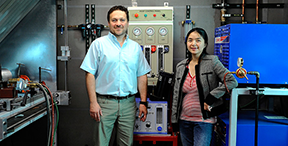 NDSU researchers have created a special coating system for metal oil and water pipelines that will save money and provide better protection for the environment.
NDSU researchers have created a special coating system for metal oil and water pipelines that will save money and provide better protection for the environment.
At the same time, the research is giving NDSU students invaluable experience that is already leading to jobs. It’s a two-in-one benefit that furthers NDSU’s focus of advancing technology and involving students in world-class research.
The new coating was developed by Fardad Azarmi, associate professor of mechanical engineering, and Ying Huang, assistant professor of civil and environmental engineering, along with undergraduate and graduate student researchers. It will help protect pipelines from corrosion, which is the leading cause of broken pipelines. It also will constantly monitor the metal’s condition, so companies can catch problems before they happen.
Here’s how it works: Optic sensors are sprayed outside the length of the pipeline to monitor the pipe’s condition. The sensors collect and transmit data to an inspector’s terminal, which helps companies make decisions about maintenance and replacing sections of pipe.
It’s a huge upgrade for an industry that usually inspects by sight or running an expensive sensing tool through the pipeline – a method that can cost millions of dollars. This technology will be especially helpful in areas prone to natural disasters, such as earthquakes and wild fires.
The NDSU researchers’ solution will be cheap by comparison. And it will catch hazardous areas before they become a problem. The sensors cost about $50 and can last 10 times longer than other sensors.
Students working with Azarmi and Huang are now qualified to work as pipeline engineers and inspectors, pipeline designers and corrosion engineers. Several have already landed internships or accepted full-time positions.
The researchers say the next phase is monitoring the inside of pipes. Eventually they expect to go wireless.
The research is supported by the U.S. Department of Transportation Pipeline and Hazardous Materials Safety Administration Competitive Academic Agreement Program. Azarmi and Huang have received two grants from the Department of Transportation, the most recent being a three-year, $375,000 award.
“The industry is thirsty for this technology and for people who understand it,” Azarmi said. “We continue to improve it, and with every step we’re finding more companies and industries that are interested.”


